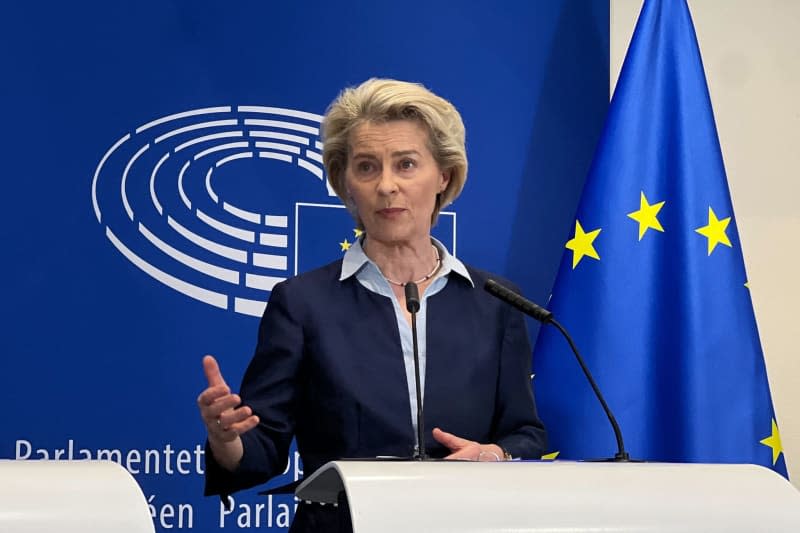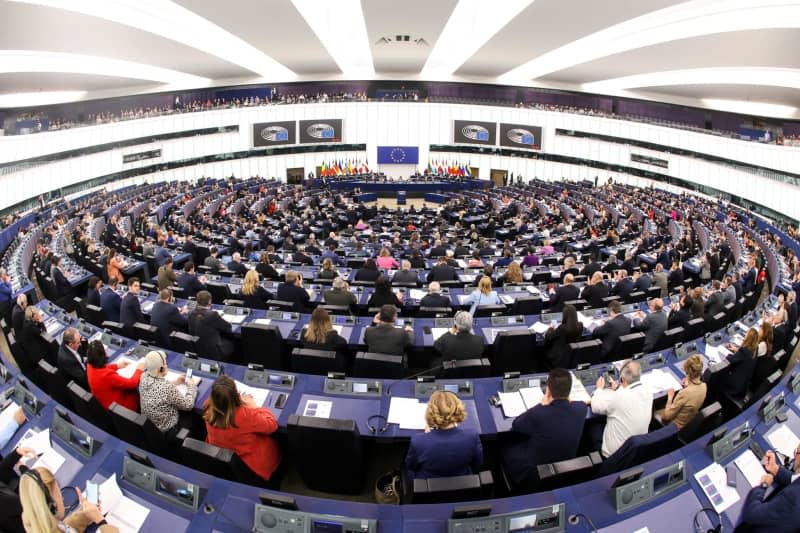European Parliament narrowly approves sweeping asylum reform

- Oops!Something went wrong.Please try again later.
The European Parliament on Wednesday adopted sweeping reforms of the European Union's migration and asylum laws, intended to strengthen borders and make the bloc's 27 member states share responsibility.
European Commission President Ursula von der Leyen said the reforms will "secure European borders" while "ensuring the protection of the fundamental rights" of migrants.
Several of the 10 legal texts approved on Wednesday passed only by narrow margins, with opposition to the reforms coming from both the right and the left. For example, a crisis mechanism designed to deal with sudden influxes of migrants was adopted with 301 votes in favour and 272 against, with 46 abstentions.
"This has been a marathon," EU Home Affairs commissioner Ylva Johansson told reporters before the vote.
The texts approved by parliament are the product of a deal brokered by the Spanish government, which during the second half of last year was responsible for negotiating on behalf of - and among - all EU member states.
The breakthrough came in December, when Spain managed to win the support of a sufficient majority of EU countries for a compromise with parliamentary negotiators, overcoming opposition from Hungary and Poland.
German Chancellor Olaf Scholz and Greek Migration Minister Dimitris Kairidis both called the reform "historic."
French President Emmanuel Macron said Europe was acting "effectively and humanely." Italy's right-wing Interior Minister Matteo Piantedosi called the deal "the best possible compromise." He said "the pact takes our needs into account."
But there was dissent, too. Hungarian Prime Minister Viktor Orbán derided the reform as "another nail in the coffin of the European Union."
"Unity is dead, secure borders are no more. Hungary will never give in to the mass migration frenzy! We need a change in Brussels in order to Stop Migration!" Orbán said in a post on X, formerly known as Twitter.
Polish Prime Minister Donald Tusk said his government "will protect Poland against the relocation mechanism." Though overwhelmingly pro-EU, Tusk's centrist coalition has maintained the opposition to the reforms established by Poland's previous right-wing government.
CRITICISM FROM ASYLUM CAMPAIGNERS AND LEFTWINGERS
Groups campaigning for more liberal migration and asylum policies also slammed the pact, which includes building border centres to hold asylum seekers, and sending some to non-EU countries deemed to be safe.
Amnesty International said the EU was "shamefully" backing a deal that "they know will lead to greater human suffering." The Red Cross urged member states "to guarantee humane conditions for asylum seekers and migrants."
The vote itself was initially disrupted by protesters yelling: "The pact kills, vote no!" while dozens demonstrated outside the parliament building in Brussels.
The deal was "a pact with the devil," said French Green EU lawmaker Damien Careme.
The parliament’s far-left group, which maintains that the reforms are incompatible with Europe’s commitment to upholding human rights, said Wednesday was a "dark day."
TAKING THE PRESSURE OFF EUROPE'S SOUTH
Under current EU rules, the first country of arrival bears responsibility for hosting and vetting asylum seekers and returning those deemed inadmissible. That system that has put member states on Europe's southern frontiers under pressure, and fuelled far-right opposition.
Under the new system, border centres would hold irregular migrants while their asylum requests are vetted. Deportations of those deemed ineligible would be sped up.
The reform would require other EU countries to take in thousands of asylum seekers from first-entry states such as Italy and Greece.
Alternatively, the other member states could provide money or other resources to the under-pressure nations. At least 30,000 asylum seekers a year are expected to come under this relocation system. Annual financial compensation of €600 million ($650 million) will be set for those preferring to pay money rather than host migrants.
Von der Leyen assured first-entry countries like Italy that from now on, "they will no longer be alone."
The package establishes an emergency response in the event of unexpected migration surges. In 2015-2016, more than two million asylum seekers entered the bloc, many of them from war-torn Syria and Afghanistan. Asylum requests stood at 1.14 million in 2023, the highest level since 2016.
In parallel to the reform, the EU has struck deals with other countries to stem migration, similar to its 2016 agreement with Turkey. The EU has reached accords with Tunisia and, most recently, Egypt.
HUNGARY'S SZIJJÁRTÓ: DEAL IS "GREEN LIGHT TO ILLEGAL MIGRATION."
Marine Le Pen, parliamentary group leader of France’s far-right National Rally, complained that the changes would give "legal impunity" to non-governmental organizations (NGOs) that are "complicit with smugglers".
Le Pen and her party’s leader, Jordan Bardella - who sits in the European Parliament - said they would seek to overturn the reform after elections in June, which are expected to boost far-right numbers in the EU legislature.
"This new migration pact practically gives the green light to illegal migration to Europe," Hungarian Foreign Minister Péter Szijjártó said before Wednesday's vote. He added that Budapest "will not allow illegal migrants to set foot here in Hungary."
Slovakia's social democrat-led government unequivocally rejected the new migration pact. Foreign Minister Juraj Blanár said Bratislava did not agree with the compulsory redistribution of illegal migrants.
The new pact still needs the final approval of a sufficient majority of EU member states, and then becomes binding on all. Assuming that's forthcoming, the measures are due to enter into force in 2026, after the commission has set out plans for their implementation.
The content of this article is based on reporting by AFP, AMNA, ANSA, BTA, CTK, dpa, EFE, Europa Press, Lusa, TASR and Tanjug as part of the European Newsroom (enr) project.


